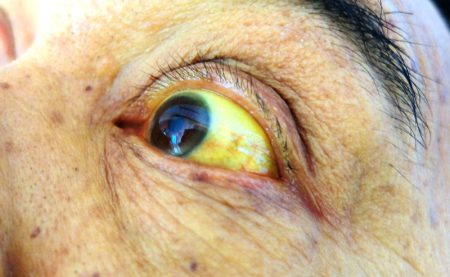Complications of Cushing’s Syndrome
- Updated on: Jul 10, 2024
- 3 min Read
- Published on Feb 5, 2020

Cushing’s syndrome occurs when there is an abnormal production of cortisol hormone in the body. Chronic exposure to excess glucocorticoid levels results in the signs and symptoms of this disease. Due to the occurrence of comorbidities, Cushing’s syndrome is associated with increased mortality and impaired quality of life.
What are the Complications Associated With Cushing’s Syndrome?
There are many complications associated with Cushing’s syndrome. Some of them may include:
- Metabolic syndrome (like visceral obesity, impairment of glucose metabolism, and dyslipidemia)
- Cardiovascular disorders (like systemic arterial hypertension, cardiac and vascular damage, thrombosis diathesis)
- Immunological disorders
- Musculoskeletal disorders (like myopathy, osteoporosis, and skeletal fractures)
- Neuropsychiatric disorders
- Impairment of reproductive and sexual function
- Dermatological manifestations (acne, hirsutism, and alopecia)
Metabolic Syndrome
Metabolic syndrome in Cushing’s syndrome is caused due to exposure to excess glucocorticoids and hypercortisolism. Excess glucocorticoids produced in Cushing’s syndrome affect various metabolic pathways in the body which ultimately results in the manifestations of metabolic syndrome. Excess glucocorticoids stimulate the key enzymes that are involved in liver gluconeogenesis. As a result, there is an increase in the glucose output and circulating glucose concentration, which ultimately leads to hepatic and peripheral insulin resistance.
More: Ectopic Cushing Syndrome
Excess glucocorticoids also interfere with the functioning of glucose transporters and therefore decrease the glucose uptake. Weight gain is also one of the common features of Cushing’s syndrome. The weight gain here is mainly abdominal rather than generalized weight gain. Also, the type of weight gain found here is visceral rather than the subcutaneous accumulation of fat tissue. Dyslipidaemia found in Cushing’s syndrome is due to an increase in the LDL cholesterol and a decrease in the HDL cholesterol levels in the blood.
Cardiovascular Disorders
Cardiovascular disorders are considered as major causes of death in Cushing’s syndrome patients. Hypertension is one of the common clinical features of Cushing’s syndrome and is caused due to an increase in the systolic and diastolic blood pressure. Hypertension is caused due to impairment in the various blood pressure controlling systems of the body due to the presence of excess glucocorticoids. These systems include the renin-angiotensin system, the mineralocorticoid activity, the sympathetic nervous system, and the vasoregulatory system.
Increased cardiac and vascular damage caused by Cushing’s syndrome increases the chances of myocardial infarction, heart failure, and strokes.
Immunological Disorders
Cushing’s syndrome suppresses the immune system of patients making them susceptible to various infections compared to the unaffected individuals. Immunosuppression is caused due to the excess glucocorticoid levels which induce substantial changes in the entire immune system besides interfering with the host defense systems. Both the humoral and cellular immune components systems get affected due to this syndrome.
Cushing’s syndrome compromises the immune system of patients and makes them susceptible to various opportunistic infections which may lead to mortality.
Musculoskeletal Disorders
Cushing’s syndrome is associated with many skeletal disorders like osteopenia, osteoporosis, and skeletal fractures. Besides, it is also responsible for reducing bone mineral density in patients. The diagnosis of Cushing’s syndrome is therefore essential for reducing various skeletal complications.
Excess production of glucocorticoids affects bone turnover and calcium homeostasis and therefore leads to various bone disorders.
Myopathy is also associated with Cushing’s syndrome because the excess glucocorticoid formation affects the structure and function of skeletal muscle through different mechanisms.
Neuropsychiatric Disorders
Cushing’s syndrome causes various neuropsychiatric disorders like depression, anxiety, and bipolar disorders. The reason behind various neuropsychiatric disorders is chronic exposure of the brain to excessive cortisol produced in this syndrome. Excessive cortisol exposure causes deep structural and functional changes in various cerebral areas especially the ones that are rich in glucocorticoid receptors.
Impairment of Reproductive and Sexual Function
Impairment of reproductive and sexual function in both men and women is one of the common clinical features of Cushing’s syndrome. Decreased libido, hypogonadism in men, and menstrual irregularity in women may also result due to Cushing’s syndrome. Cushing’s syndrome affects the hypothalamic-pituitary-gonadal axis at different levels resulting in impairment of reproductive and sexual function.
Dermatological Manifestations
Various dermatological manifestations like skin and hair abnormalities are common in Cushing’s syndrome. Skin abnormalities mainly found include hirsutism, alopecia, bruising, hyperpigmentation, and acne. Excess glucocorticoids impair the proliferation of keratinocytes and dermal fibroblasts as well as synthesis and turnover of collagen and mucopolysaccharides resulting in various skin abnormalities.
Serious complications associated with Cushing’s syndrome can be prevented with prompt treatment of cortisol excess and specific treatments of comorbidities. Controlling the cortisol levels may also help in reducing the mortality associated with this syndrome.
Can Someone Die From Cushing Syndrome Complications?
Cushing’s syndrome can generally be cured. However, if the condition and associated complications are left untreated, it can lead to serious health problems, and even cause death. Therefore, it’s important to start the treatment right away as soon as you notice the early signs.
If steroid medicine is the reason of your Cushing’s syndrome, your doctor will help adjust your dose or gradually stop it. Symptoms will go away soon. It’s very dangerous to stop your steroid medicines on your own. Take appropriate consultation of your doctor before changing drug dosage.
If your Cushing’s syndrome is due to a tumor, your doctor will refer you to a surgeon who will remove it. If surgery doesn’t help, you will be given radiation or medicines to treat the complications and signs of Cushing’s syndrome. Read more about Cushing’s Syndrome Treatment.











